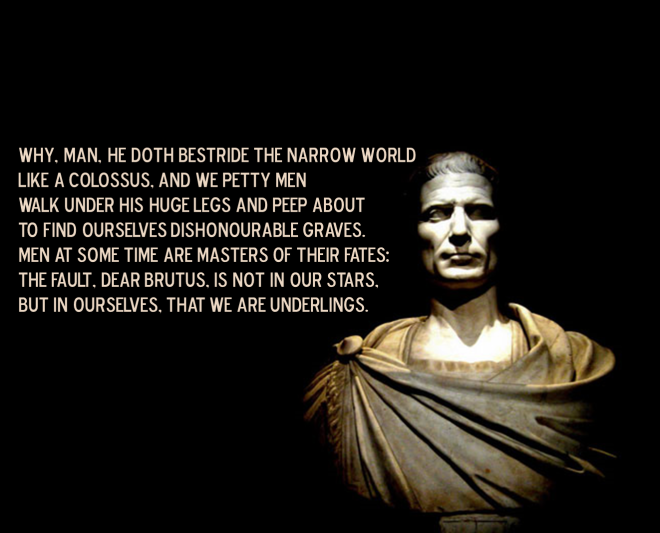The Nature of Power
Power corrupts and absolute power corrupts absolutely.
“That what he is, augmented,/Would run to these and these extremities:/And therefore think him as a serpent’s egg/Which, hatch’d, would, as his kind, grow mischievous,/And kill him in the shell” (Shakespeare, Julius Caesar, 2.1.30-34).

Readings:
* “Why Read Shakespeare?” Michael Mack (use your school email/password to sign into https://my.hrw.com)
* From Julius Caesar Text
* Tragedy, from Aristotle’s Poetics
Notes:
* Julius Caesar Intro
* Propaganda & Advertising
* MLA Reminders
Assignments
* Julius Caesar Elements of Persuasion Study Guide
* Insult Sonnet
* Propaganda Project
Tragedy, from Aristotle’s Poetics
Tragedy: a dramatic work that presents the downfall of a dignified character who is involved in historically or socially significant events.
- According to Aristotle in his Poetics, tragedy is good for the state (political) because people go to the theater and are purged of their emotions; they, as a result, leave more docile (calm).
- A good tragedy can recreate. This has to do with the belief in a cosmic order, of nobility and dignity. Sometimes the sacrifice of one person regains the cosmic order, and society is better off (also, the idea of the scapegoat—one must fall/suffer for the rest to remain whole).
Tragic Hero
1.Morality – he is neither extremely virtuous nor extremely vicious. He is not outstanding, but is most like us. (He wouldn’t have a tragic flaw if he were too good!)
2.He has a tragic flaw (hamartia) – this can be a misstep, a misjudgment, an error that brings about his own destruction. There is something within his character that contributes to or brings about his destruction. It is a virtue carried to excess, usually a minor thing, like HUBRIS (excessive pride).
3. Social position – a tragic figure must be famous or prosperous.
Possible reasons:
a) He has more to lose.
b) He is supposed to be a leader of society.
c) More than just himself is affected.
4) Suffering and misfortune (peripeteia) – he undergoes a change of fortune that brings about suffering or death. The suffering is not always physical; it can be mental torture (psychological). The suffering is often unwarranted; it may not be deserved
5) Tragic recognition (anagnorisis)– When the hero recognizes what he has done, the reader can sympathize with him. This recognition comes at a reversal in situation.
6) Catharsis – If he is a good tragic hero, a purging of the emotions of pity and fear (catharsis), a sympathy, a release of the emotions, will occur within the audience.
Videos